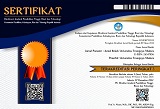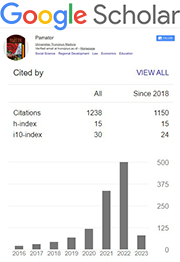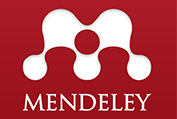Implementation of Cash Waqf Management (Studies at the Ziswaf Board of Kopontren Al Yasini Pasuruan)
Abstract
Waqf is one of the instruments of the Islamic economy that aims to achieve the objectives of the Islamic economy, namely producing a rich life. The concept of Waqf is still considered to be the practice of the rich, because the payment is identical to that of land and buildings. Currently, in Indonesia, there is a new method of paying off the waqf that is available, this is cash-based and is derived from Law number 41 of 2004 regarding the management of cash-based funds associated with the waqf. This investigation describes the procedure of implementing cash waqf in the Al-Yasini Kopontren Ziswaf Agency as an Amil Zakat Organization that has employed cash waqf. This research employs a qualitative methodology with data analysis methods that involve interaction. From the research results, it is apparent that the utilization of cash funds at the Al-Yasini Kopontren Ziswaf Board is invested in the form of shares in the retail business "Al Yasini Mart". The income from the dividend is dedicated to funding scholarships for impoverished, unfortunate, and unlucky Al-Yasini Islamic Boarding School students, students who are exceptional in school, and hafidz students who memorize the Quran.
Keywords
Full Text:
PDFReferences
Aqilurachman, Transformasi Pengelolaan Wakaf Digital Pada Praktik Aplikasi Al-YasiniQu (Jember: Universitas Islam Negeri Kiai Haji Achmad Siddiq Jember, 2023)
Darwanto, “Wakaf Sebagai Alternatif Pendanaan Penguatan Ekonomi Masyarakat Indonesia,” Jurnal Ilmu Manajemen Dan Akuntansi Terapan (JIMAT), 3.1 (2012)
Havita, “Bank Wakaf Di Indonesia Dalam Potensinya Untuk Mengembangkan Wakaf Uang Dan Mengatasi Kemiskinan,” 2014
Hazami, “Peran Dan Aplikasi Wakaf Dalam Mewujudkan Kesejahteraan Umat Di Indonesia,” Analisis: Jurnal Studi Keislaman, 16.1 (2016)
Huda, Irkham Abdaul, “Perkembangan Teknologi Informasi Dan Komunikasi (Tik) Terhadap Kualitas Pembelajaran Di Sekolah Dasar,” Jurnal Pendidikan Dan Konseling (JPDK), 2.1 (2020), 121–25
Jalaludin, “Miftahul Jannah Jatibaru Kecamatan Jatisari Karawang,” EKSISBANK (Ekonomi Syariah Dan Bisnis Perbankan), 4.1 (2020)
Kementerian Agama RI, Pedoman Pengelolaan Wakaf Uang, Direktorat Jenderal Pengembangan Zakat Dan Wakaf Direktorat Bimbingan Masyarakat Islam Dan Penyelenggaraan Haji (Jakarta, 2015)
Lubis, Mustamam, and Akhyar, “Analisis Yuridis Gerakan Nasional Wakaf Uang (Gnwu) Dalam Perspektif Undang-Undang Nomor 41 Tahun 2004 Tentang Wakaf,” 4.1 (2022), 139–65
Maulidi, “Wakaf Tunai, Implementasinya Dalam Sistem Perbankan Syariah Di Indonesia,” Jurnal Ekonomi Dan Perbankan Syari’ah, 4.2 (2017)
Miceli, Thomas, Economics of the Law: Torts, Contract, Property, Litigation, 1997
Miles, and Huberman, “Qualitative Data Analysis: An Expanded Sourcebook,” 1994
Mughnisari, Pengelolaan Wakaf Tunai Di Yayasan Wakaf UMI (Makasar: UIN Alauddin Makasar, 2014)
Nasution, Pengenalan Eksklusif Ekonomi Islam (Jakarta: Kencana Prenada Media Group, 2016)
Raibowo, Nopiyanto, and Muna, “Pemahaman Guru PJOK Tentang Standar Kompetensi Profesional,” Journal Of Sport Education (JOPE), 2.1 (2019), 10
Savhira, “Semangat Berdayakan Umat Dan UMKM, Al-Yasini Raih Kopontren Terbaik Di Bidang Pemasaran,” 2020
Sulistyani, Asikin, Soegianto, and Sadono, “Pelaksanaan Dan Pengembangan Wakaf Uang Di Indonesia,” Jurnal Usm Law Review, 3.2 (2020), 328
Syafiq, “Wakaf Tunai Untuk Pemberdayaan Usaha Kecil,” 2014
Tho’in, and Prastiwi, “Wakaf Tunai Perspektif Syariah,” Jurnal Ilmiah Ekonomi Islam, 01.01 (2015), 61–74
Triwibowo, Ananto, “Penerapan Prinsip-Prinsip Good Corporate Governance Dalam Pengelolaan Wakaf Tunai Pada Badan Wakaf Uang Tunai MUI Yogyakarta,” Tapis : Jurnal Penelitian Ilmiah, 4.1 (2020), 123
Usman, Hukum Perwakafan Di Indonesia (Jakarta: Sinar Grafika, 2013)
Utami, and Ismail, “Implementasi Pengelolaan Wakaf Tunai ( Studi Pada Baitul Maal Hidayatullah & Yayasan Dana Sosial Al-Falah ) Anisa Fitria Utami,” 41, 2014, 1–16
DOI: https://doi.org/10.21107/pamator.v16i3.20181
Refbacks
- There are currently no refbacks.
Copyright (c) 2023 Muhammad Rif'an Syadali, Nur Asnawi, Parmujianto Parmujianto

This work is licensed under a Creative Commons Attribution-ShareAlike 4.0 International License.
Jurnal Pamator : Jurnal Ilmiah Universitas Trunojoyo by Universitas Trunojoyo Madura is licensed under a Creative Commons Attribution-ShareAlike 4.0 International License.















.png)